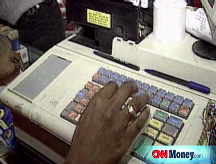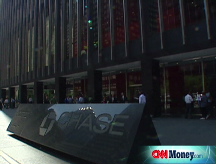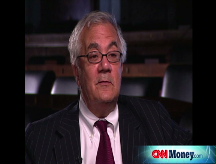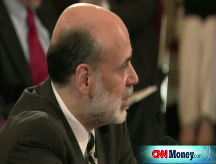Huge rebound for Wall Street
Dow soars by largest margin in more than 3 months on plummeting oil prices and positive financial reports from banks and airlines.

NEW YORK (CNNMoney.com) -- Stocks got a big bounce back Wednesday as investors welcomed encouraging news from the banking and airline sectors. Falling oil prices also helped spark a strong stock market rally.
The Dow Jones industrial average (INDU) gained 277 points to end the day more than 2.5% higher. Wednesday's rise marked the largest one-day increase in the Dow since April 1. The Dow rallied back after ending Tuesday at its lowest level since July 21, 2006.
The Standard & Poor's 500 (SPX) index also added 2.5%, and the tech-laden Nasdaq composite (COMP) gained 3.1%. The S&P 500 bounced back from its lowest close since Nov. 2, 2005.
The rally came despite a reading showing a jump in inflation. The Consumer Price Index, a key inflation gauge, soared 5% in the past year - the biggest annual jump in more than 17 years. Record gas and food prices helped the index jump to levels that outpaced the average annual pay increase. (Full story)
Stocks were volatile in early trade as investors were spooked by the CPI report, reflecting a knee-jerk reaction to any bad news in the continually tepid economic climate.
However, the market turned higher quickly after the open as traders absorbed several positive corporate results. Investors welcomed the news as a sign of relief on pressured markets.
"The market can't go down forever," said Harry Clark, chief executive of Capital Management Group. "Investor sentiment was so negative that any news can now be taken as a positive."
Stocks were sent even higher after oil plunged following the government's weekly stockpile report, and maintained steady gains for the remainder of the session.
"The stock market is a game of confidence, and it feels like confidence has been restored to some degree," said Robert Philips, president and chief investment officer of Walnut Asset Management. "Oil falling is obviously very helpful for that."
Investors will see if the market can sustain a run Thursday as several more bank earnings are due before the market open. Reports on housing starts, initial jobless claims and the Philadelphia manufacturing sector will also be released Thursday.
After the market close, online auction Web site eBay (EBAY, Fortune 500) announced earnings rose 22%, beating Wall Street's expectations. Shares of eBay fell 6% in aftermarket trading, however, as its third-quarter earnings forecast failed to impress investors.
Financials bounce back: Financial industry stocks rebounded strongly Wednesday morning, as some upbeat corporate results helped ease some investor concerns about the battered industry, lifting the S&P Banking Index by more than 20%. (Full Story)
Shares of Wells Fargo (WFC, Fortune 500) soared 32.8% after it reported a 22% drop in second-quarter earnings that nevertheless topped estimates. The struggling bank cited a growing number of unpaid loans for the slide, but raised its quarterly stock dividend to 34 cents a share from 31 cents a share.
Other financial names also reported results that were ahead of expectations, including Charles Schwab (SCHW, Fortune 500), whose stock rose 14.3%, Northern Trust (NTRS, Fortune 500), up 13.1%, and Marshall & Ilsley (MI, Fortune 500), which gained 17.3%.
"The bank situation is coming to an end now," said Clark. "We're looking at a rally ahead of us - though how long that rally will last is unclear."
Federal Reserve Chairman Ben Bernanke appeared before the House Financial Services Committee Wednesday after testifying before the Senate Banking Committee Tuesday. In his testimony, Bernanke stated that government-backed mortgage financers Fannie Mae and Freddie Mac are "in no danger of failing." (Full story)
That helped Fannie (FNM, Fortune 500) and Freddie (FRE, Fortune 500) soar 30% in Wednesday trading. The embattled firms were the focal points of downtrodden investor sentiment toward financials for several of the previous sessions.
Shares of Washington Mutual (WM, Fortune 500) jumped 25.5%, helping the bank bounce back from a selloff earlier in the week. A Lehman Brothers analyst note released Monday suggested the bank may need to "substantially" raise its reserves over the course of 2008 to cover losses from home loans.
Other struggling financials jumped on the bandwagon. Bank of America (BAC, Fortune 500) rose 22.4%, JPMorgan Chase (JPM, Fortune 500) gained 15.9%, Wachovia (WB, Fortune 500) soared 16.1% and Citigroup (C, Fortune 500) added 13.1%.
Shares of investment bank Lehman Brothers (LEH, Fortune 500) also soared 26% despite investor concern that the firm may be on the verge of a Bear Stearns-like collapse.
Financials have been hammered for the past several quarters after the subprime mortgage collapse and ensuing credit crisis. After the bank failure of IndyMac Friday, financials went into a virtual tailspin.
But some analysts think IndyMac's failure is a sign that the worst is over.
"The catalyst for Wednesday's rally was actually the IndyMac failure," said Clark. "Every major bank failure over the last 40 or 50 years represented a market bottom."
Airlines: American Airlines and Delta Air Lines reported wide losses Wednesday, citing fuel-related costs, yet both companies beat analysts' expectations. (Full story)
No. 3 U.S. carrier Delta Air Lines (DAL, Fortune 500) reported a net loss of $1 billion for the second quarter, including a writedown of $1.2 billion. Delta said it had to cope with a $1 billion year-to-year increase in fuel costs. Shares climbed 26.6%
AMR Corp (AMR, Fortune 500), parent company of No. 1 carrier American Airlines, reported a net loss of $1.4 billion, or $5.77 per share, for the second quarter. But that included $1.1 billion in one-time writedowns. Shares of AMR Corp. surged 32% Wednesday.
Falling oil prices and the upbeat quarterly results lifted other airlines, with most of the major U.S. carriers soaring.
Continental Airlines (CAL, Fortune 500) rose 38.2%, US Airways (LCC, Fortune 500) gained 27.3% and JetBlue (JBLU) added 21.4%. UAL Corp. (UAUA, Fortune 500), the parent company of United Airlines, was especially strong, gaining 41.5%
"Airlines' losses have been monumental forever but were only exacerbated recently by high oil prices," said Philips. "When oil goes down, there's some hope they'll lose less."
Energy: Oil prices tumbled another $4.14 Wednesday, settling at $134.60. That drop comes after oil plunged more than $6 a barrel Tuesday - the biggest one-day drop in 17 years. (Full story)
The U.S. Energy Information Administration's weekly stockpile report showed that crude supplies rose by 3 million barrels for the week, when analysts were looking for a drop of 3 million barrels.
The average price of regular unleaded gasoline rose to an all-time high of $4.114 a gallon, according to a daily survey from motorist advocacy group AAA. (Full story)
Economic news: Industrial production increased 0.5% in June, stronger than a 0.2% decline in May, according to a report released by the Federal Reserve Wednesday. The measure roundly beat economists' expectations. (Full story)
The National Association of Home Builders/Wells Fargo Housing Market Index - a key measure of home builder confidence - fell for the third consecutive month, hitting a record low in July. (Full story)
Dollar rises: In currency trading, the dollar bounced back after setting an all-time low versus the euro Tuesday and slipping to a $2 level against the British pound. (Full story)
Other markets: COMEX gold for August delivery fell $16 to settle at $962.70 an ounce. Gold has crept back near record levels recently after falling into the $800 range in the past few months.
Treasury prices sank sharply Wednesday, raising the yield on the benchmark 10-year note to 3.95% from 3.84% late Tuesday. Bond prices and yields move in opposite directions. ![]()






